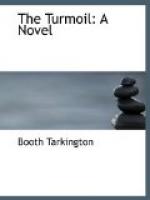“Look, here!” said Sheridan. “Bibbs might ‘a’ kept goin’ on over there the rest of his life, moonin’ on and on, but what he heard Sibyl say did one big thing, anyway. It woke him up out of his trance. Well, he had to go and bust clean out with a bang; and that stopped his goin’ over there, and it stopped his poetry, but I reckon he’s begun to get pretty fair pay for what he lost. I guess a good many young men have had to get over worries like his; they got to lose something if they’re goin’ to keep ahead o’ the procession nowadays —and it kind o’ looks to me, mamma, like Bibbs might keep quite a considerable long way ahead. Why, a year from now I’ll bet you he won’t know there ever was such a thing as poetry! And ain’t he funny? He wanted to stick to the shop so’s he could ‘think’! What he meant was, think about something useless. Well, I guess he’s keepin’ his mind pretty occupied the other way these days. Yes, sir, it took a pretty fair-sized shock to get him out of his trance, but it certainly did the business.” He patted his wife’s shoulder again, and then, without any prefatory symptoms, broke into a boisterous laugh.
“Honest, mamma, he works like a gorilla!”
CHAPTER XXI
And so Bibbs sat in the porch of the temple with the money-changers. But no one came to scourge him forth, for this was the temple of Bigness, and the changing of money was holy worship and true religion. The priests wore that “settish” look Bibbs’s mother had seen beginning to develop about his mouth and eyes—a wary look which she could not define, but it comes with service at the temple; and it was the more marked upon Bibbs for his sharp awakening to the necessities of that service.
He did as little “useless” thinking as possible, giving himself no time for it. He worked continuously, keeping his thoughts still on his work when he came home at night; and he talked of nothing whatever except his work. But he did not sing at it. He was often in the streets, and people were not allowed to sing in the streets. They might make any manner of hideous uproar—they could shake buildings; they could out-thunder the thunder, deafen the deaf, and kill the sick with noise; or they could walk the streets or drive through them bawling, squawking, or screeching, as they chose, if the noise was traceably connected with business; though street musicians were not tolerated, being considered a nuisance and an interference. A man or woman who went singing for pleasure through the streets—like a crazy Neopolitan—would have been stopped, and belike locked up; for Freedom does not mean that a citizen is allowed to do every outrageous thing that comes into his head. The streets were dangerous enough, in all conscience, without any singing! and the Motor Federation issued public warnings declaring that the pedestrian’s life was in his own hands, and giving directions how to proceed with the least peril. However, Bibbs Sheridan had no desire to sing in the streets, or anywhere. He had gone to his work with an energy that, for the start, at least, was bitter, and there was no song left in him.




